This is the first of a several-part series on my grandfather, Thomas Austin Merica.
Thomas Austin Merica was born on May 28, 1884 in Greene County, Virginia. Or at least that’s the family legend.
He was from sturdy German stock, tall and broad-shouldered, with strong arms that could swing an ax and big hands that could grip a plow. He’d do plenty of both in his life.
There are no documents, no photos, no heirlooms to help inform the history of Tom Merica’s heritage. There is only the story that his family came to Page County, Virginia from over the Blue Ridge Mountains, in Greene County. And that story turns out to be wrong.
That, and the story that he and his siblings were abandoned by their parents, which turns out to be right.
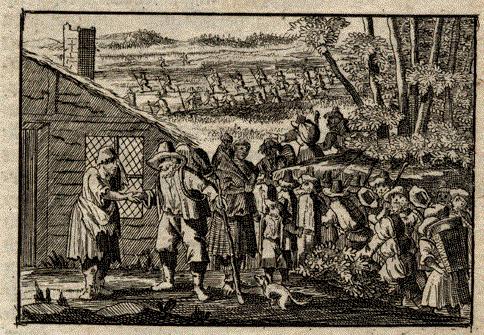 Tom’s ancestors, it seems, came to America from the Palatinate region of Germany early in the 1700s, settling in Pennsylvania.
Tom’s ancestors, it seems, came to America from the Palatinate region of Germany early in the 1700s, settling in Pennsylvania.
Thousands of Germans were emigrating to Pennsylvania, escaping a semi-feudal and poverty-stricken society that had been embattled in wars for a hundred years or more.
First the Thirty Years War, and then Louis XIV of France kept picking on Protestants wherever he could find them, which meant up the Rhine River.
Then came famine. And more war. Which made a gruesome 12-week journey across the Atlantic with 400 others in a small ship seem absolutely delightful. William Penn had been advertising the awe-inspiring wonders of America to the war-weary Germans.
How could they resist?
Peace! Farmland! Freedom!, he cried out on the handbills his workers spread throughout the Rhineland.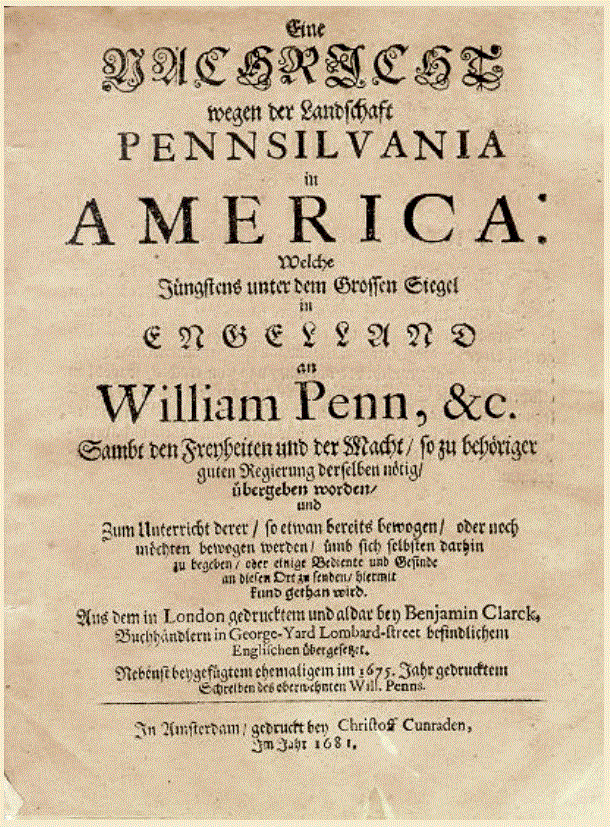
He called the American colonies “the seeds of a nation,” said potential immigrants could practice their religion freely, and assured them they would be paid more here than at home.
He extolled the plenty available to all. In fact, there was “more being produced and imported than we can spend here, we export it to other countries in Europe, which brings in money.”
Anticipating his audience’s desire for “stuff,” he told them they would have three times as much of it in America, of “all necessities and conveniences (and not a little in ornamental things, too).”
Who wouldn’t come?
So Tom’s ancestors landed at the harbor of Philadelphia, and from there they appear to have traveled to the inland regions, perhaps Bucks County, or Lancaster, where so many other Germans settled, and whose unique ways can still be seen today in the Pennsylvania Dutch. But that is a misnomer; the Germans called themselves Deutsch, and Americans misinterpreted it as Dutch.
We don’t know the names of these ancestors any more than we know where they lived, what they did to earn their living, whether they fought off Indians, served as soldiers, died in childbirth, or sang in the church choir.
We know only that they came to America searching for a good life, and hopefully found it out there the edges of society, in those borderlands advertised so vividly by William Penn.
Tom Merica’s ancestors stayed in Pennsylvania for several generations, we believe. 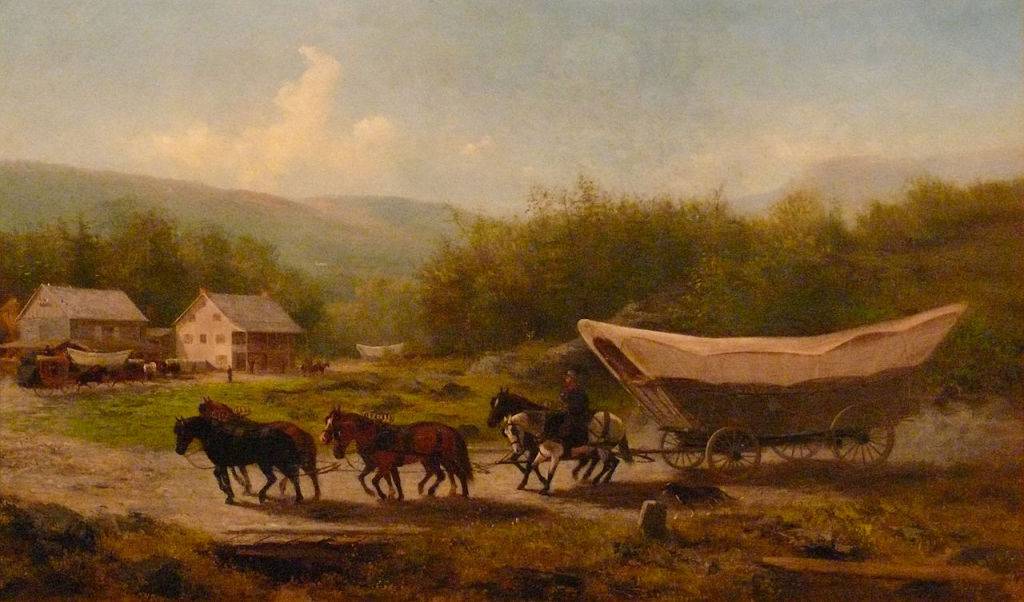 Then, like so many German immigrants, they packed their belongings, maybe into a Conestoga wagon, that most practical of German American inventions, and turned south.
Then, like so many German immigrants, they packed their belongings, maybe into a Conestoga wagon, that most practical of German American inventions, and turned south.
I don’t know why they went south. Perhaps they heard of the rich farmland to be had in Virginia and Carolina. Or perhaps they were tired of watching over their shoulders for hostile Natives, which were always a problem for settlers in the borderlands of Pennsylvania.
So they joined the flow of German and Scots-Irish immigrants on the Great Wagon Road, a 735-mile trail that carried hundreds of thousands of settlers to their own promised land in the southern colonies and beyond.
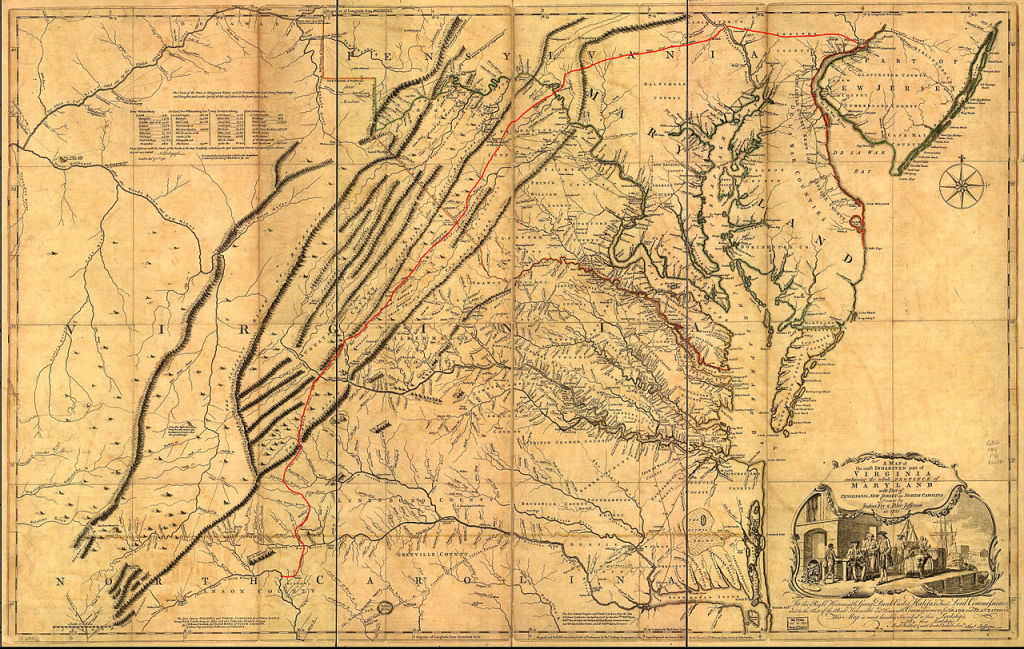 Perhaps Tom’s great-great grandfather, Johannes Markey, drove a Conestoga wagon down that great highway.
Perhaps Tom’s great-great grandfather, Johannes Markey, drove a Conestoga wagon down that great highway.
He might have traveled with the family of Philip Dietz, his future father-in-law.
The Dietzes had previously lived in Lancaster, Pennsylvania, where they belonged to the First Reformed Church. It was customary for German immigrants from a particular town or large family to emigrate together as a group, which is a clue that young Mr. Markey might have been from the Dietzes’ homeland, Baden-Württemberg, in Germany.
By 1795 the Dietzes had settled in Rockingham County, Virginia, where Philip’s daughter Elizabeth married Johannes Merkey and became Tom Merica’s great-great grandmother.
Johannes changed his name from Merkey to Merica. But he forgot to change how the name was pronounced, so now, nearly 125 years later, half the family says, “Merica” and half says, “Merkey.” Go figure.
The couple proceeded to have seven children, six boys and a girl, including their second oldest, Tom Merica’s grandfather, George.
George was born near the dawn of the 19th century, 1799, a time that marked a dramatic shift from pre-industrialism to the modern world. The Industrial Revolution was creating new, technological solutions to age-old problems. And it was speeding up the world as never before.
But not on a farm that ran along Naked Creek in Page or Rockingham county, Virginia. Life there remained pretty much as it would have been for centuries.  Women loomed their own cloth, men hoed the earth with hand-made tools. Families lucky enough to have a plow horse were as close to technologically advanced as it got.
Women loomed their own cloth, men hoed the earth with hand-made tools. Families lucky enough to have a plow horse were as close to technologically advanced as it got.
It would be more than 120 years before people here had the electric light. More than 160 before they had a telephone. Roads would remain unpaved well into the 20th century.
So Johannes and Elizabeth farmed, loomed, hunted, sewed, and made a home for their children the only way they knew how. The old ways nourished their parents, and their parents’ parents before them, and they would nourish this family now.
When the couple’s son George was 27 he married 19-year old Catherine Wagoner. They stayed near the elder Merkeys and Dietzes, and eventually built a farm somewhere along the 20-mile stretch of Naked Creek between the town of Shenandoah and the Skyline Drive, land so pretty it makes you cry.
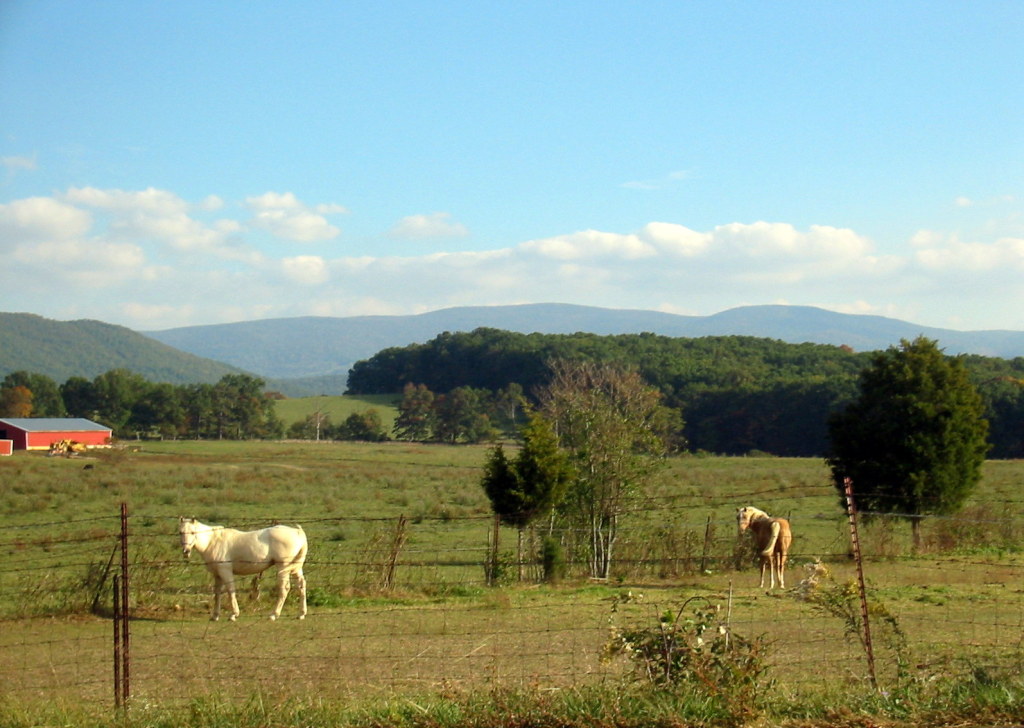 I’ve found nothing to say if George had rich bottom land or farmed the poorer-soiled hillsides of Piney Mountain, or maybe Green or Grindstone mountain.
I’ve found nothing to say if George had rich bottom land or farmed the poorer-soiled hillsides of Piney Mountain, or maybe Green or Grindstone mountain.
I only know that he had a bundle of land, and that 80 years later, as young men, two of his grandsons were building side-by-side frame homes and starting farms in the Fleeburg section of Shenandoah.
Tom Merica and his brother Hunter had bought out the inheritance of their other siblings, so this must have been their missing parents’ land, or perhaps their grandparents’.
But wait. Their missing parents?
Tom and Hunter’s parents were Joseph W. Merica, who was George and Catherine’s youngest son, and Elizabeth Turner. They probably pronounced their name, “Mer-key.”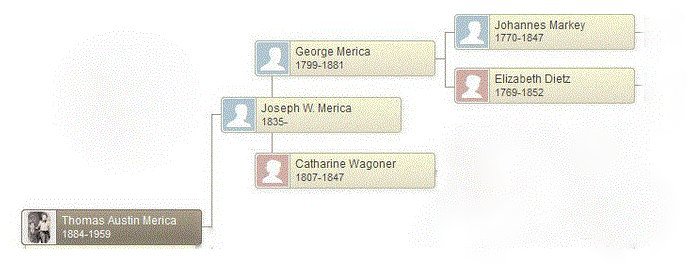 Joe was 24, a blacksmith, when he married 16-year old Elizabeth. They lived near George and the new wife he married after Catherine died. But it would be six more years before Joe and Elizabeth would start a family.
Joe was 24, a blacksmith, when he married 16-year old Elizabeth. They lived near George and the new wife he married after Catherine died. But it would be six more years before Joe and Elizabeth would start a family.
Twenty years later, in the 1880 census, they were still there. J oe was listed in the census as a farmer. He was 44 by this time, Elizabeth 38. The three older children were named in the census as well, but it would be another year before little Maggie was born, and four years before Thomas Austin Merica came into this world.
oe was listed in the census as a farmer. He was 44 by this time, Elizabeth 38. The three older children were named in the census as well, but it would be another year before little Maggie was born, and four years before Thomas Austin Merica came into this world.
It would be 26 years before he married Florence Elizabeth Collier, my grandmother, and 40 years before my mother, Ruth Virginia Merica, was born.
A lot would happen in the next 40 years, and the next 40. But we’ll leave that for another story.
To make sure you don’t miss the next installment of Tom Merica’s story, go to the “subscribe” button at the top of this page.

You have done a wonderful job on reseach and History Cindy!!! Thanks so much for all the hard work and time you have put into this. You finally found the answer to the lifelong question as to wy so many people still say Merkey instead of Merica.
Patsy, there are still a lot of mysteries in Tom Merica’s life. I wish we knew what happened to his parents, and who raised him. All Mom remembers is that it was “a Catholic family.” Her father visited them occasionally.
An inspiring site. I am also a descendant of German settlers in America. My roots come from a German Lutheran preacher who came to PA in 1752 upon invitation and established a home church in Hanover, PA. Post Revolutionary War, three of his sons settled in the Blue Ridge mountains. Two of the brothers have a heritage and descendants still in that region, but my direct line continued to move west and generation by generation proceeded into TN, KY, IL, NE, KS, CO and finally into Washington where I was born in 1946. In 1980 I moved to CA near Yosemite NP. I retired in 2009 and moved to NC where some of our children live. I am 6 years into researching my BAUGHER family heritage. I was invited to attend the Blue Ridge Heritage “Home Coming” and found your site from there. Love your prospective on the ‘Evictions’ and look forward to reading more.
Thanks for your comments, Ronald. Have you joined the Blue Ridge Genealogy Facebook group yet? You will find lots of Baughers there. Come join us. These people will know a lot about your family’s history, I bet.
I too am German descent-Hammer surname same area-even have an Elizabeth Merica married to John Hammer.
I remember my mother talking about the Hammers. I wonder if we’re related. Of course, everyone back there is!
have you ever had your autosomal dna done yet? I am still on the hunt for the elusive Hammer ancestor to my Henry Hammer, who lived around that same area and then down around Conrad’s Store, present day Elkton.
Hi Linda – I came across this blog with your comment & then this link below about the same time. Hope this helps!
https://www.geni.com/people/Henry-Hammer-Sr/6000000033809756843